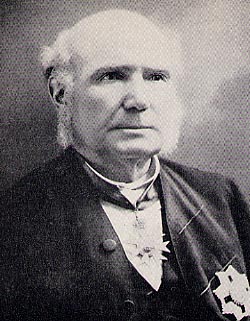
History

 |
Newfoundland History |
 |
Newfoundland History
First Confederation Talks of Newfoundland With Canada
(1864-1869)
[This text was publihed in 1950. For the full citation, see the end of the document. Links, images and parts in brackets [...] have been added to the original text by Claude Bélanger. Further information on the subject of Newfoundland and its failure to join Canada in the Confederation period will be found in this page.]
When the question of federation of the British North American colonies was first raised in 1858, Newfoundland showed some interest. Newfoundland was not invited to the Charlottetown Conference in 1864, which, while originally called to discuss only a union of the three Maritime Provinces, later developed into a conference of all the mainland colonies. At the Quebec Conference later in the same year, called to discuss the larger union of all the colonies, Newfoundland was represented by a bi-party delegation consisting of F. B. T. Carter and Ambrose Shea. [See the Speeches by Carter and Shea; consult the biographies of Shea and Carter at the DCB] The delegation had no power to commit the Newfoundland Government but both Carter and Shea became enthusiastic supporters of union and after the Conference spoke publicly in favour of it on a lecture tour of the cities on the mainland. [See the Report of the Newfoundland Delegation to the Quebec Conference.]

F. B. T. Carter
Father of Confederation
No decisive action was taken by the Newfoundland Government before Confederation became effective. Accordingly Newfoundland, like Prince Edward Island, was not represented at the Westminster Conference of 1866 when the British North America Act was drafted. Sections 146 and 147 of the Act, however, expressly provided for the admission of Newfoundland, Prince Edward Island and British Columbia should they decide later to join.
The Quebec Conference evidently recognized that the general financial arrangements provided in the scheme of union would not quite meet Newfoundland's needs. In any event, the proposed terms provided for a special additional payment from the Government of Canada to Newfoundland of $150,000 annually, in return for the handing over to the Government of Canada of mineral and property rights in Newfoundland Crown lands. The Newfoundland Government subsequently felt that these terms were inadequate, and negotiations were accordingly reopened in 1869 and better terms agreed on. Under the revised terms the annual grant was to remain the same, but Newfoundland was given the option of reserving Crown lands before entering the union. A special subsidy was proposed for the encouragement of Newfoundland fisheries, and Canada agreed that "no exceptional tax" should be levied on any of the exports of Newfoundland. The Canadian Government also undertook to encourage the formation of a naval reserve force in Newfoundland and to use its influence to persuade the British Government to maintain a garrison at St. John's; it further agreed to provide year-round steam communication between Newfoundland, the United Kingdom and Canada and to maintain a postal service to Labrador. Finally, the terms stipulated that arrangements for confederation were not to be completed until an appeal had been made to the people of Newfoundland at the next general election.

Ambrose Shea
Father of ConfederationIn the meantime, however, a strong anti-confederation movement had grown up in Newfoundland under able leadership, and when, in 1869, the Government went to the country on a confederation platform, it was decisively defeated. [See the Anti-Confederation Song; Melvin Baker discusses Newfoundland's rejection of Confederation in the period of 1865-1874 at this address. The National Library of Canada also has an extensive page on the history of negotiations of union between Newfoundland and Canada.]
Source: GOVERNMENT OF CANADA , Newfoundland . An Introduction to Canada's New Province, Published by authority of the Right Honourable C. D. HOWE, Minister of Trade and Commerce, prepared by the Department of External Affairs, in collaboration with the Dominion Bureau of Statistics, Ottawa, 1950, 142p., pp. 15-41.
© 2004 Claude Bélanger, Marianopolis College |